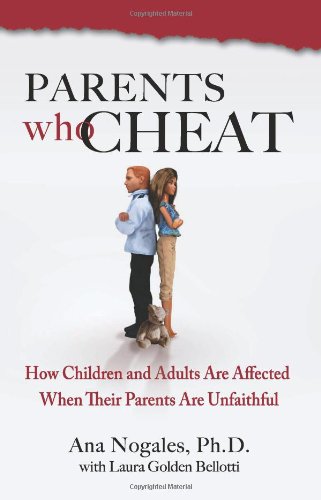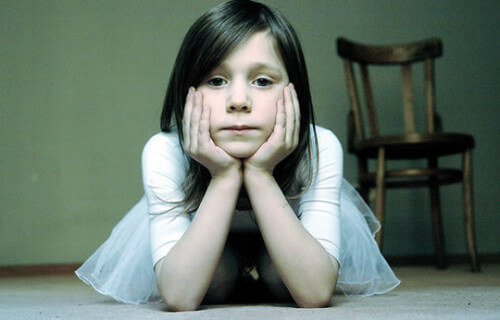1. All Articles, Infidelity: Children & Young Adults
Children Of Infidelity
Are children truly effected if one of their parents cheat?
How do the children really feel about their Dad or Mom cheating?
Ana Nogales, Ph.D., author of Parents Who Cheat: How Children and Adults Are Affected When Their Parents Are Unfaithful, coined the term “children of infidelity” to identify children of any age whose parent or parents engage in one or more acts of infidelity. As permissive as society has become, most children are badly hurt by a parent’s infidelity because, like the betrayed parent, they feel betrayed.
More than 800 grown children whose parents were unfaithful responded to an online “Parents Who Cheat” survey.
- 88.4% felt angry toward the cheating parent.
- 62.5% felt ashamed or embarrassed.
- 80.2% felt that it influenced their attitudes toward love and relationships.
- 70.5% said their ability to trust others had been affected.
- 83% stated that they feel people regularly lie.
- 86% reported they still believe in monogamy.
By and large, adult children of infidelity know, from experience, the extent to which a family suffers with a parent’s betrayal, and so do not want to follow in their unfaithful parent’s steps.
[box type=”info”] A 2007 survey found 93% respondents rated faithfulness as the single most important component of a successful marriage.[/box]Nogales’s survey confirms that children feel betrayed when a parent betrays a spouse. While the betrayed parent may not expect anything from the cheating spouse, their child is left with hopeful expectations as well as a host of fears. Children often find themselves in a nightmare that offers few viable options. One option is to accept the unacceptable: that they have been betrayed by their parent, and hope that by doing this they will ensure their parent’s love and attention. Another option is to express their outrage, and in doing so risk being abandoned by a person whose love they so desperately want and need. Whether six, sixteen, or twenty-six years of age at the time of a parent’s infidelity, these children are left with psychological issues that—unresolved—can plague them throughout their life.
Responses to Parental Infidelity

Regardless of their age, children whose parents have been unfaithful often react with intense feelings of anger, anxiety, guilt, shame, sadness, and confusion. They may act out, regress, or withdraw. They may feel pressured to win back the love of the unfaithful parent or to become the caretaker of the betrayed parent. The bottom line is that when parents are role models of infidelity, their children can’t help but react—and they may have a particularly hard time finding their way through the challenging time of dating and marriage.
While every family is different, and each child is unique, the following core responses experienced by children of all ages—from young children to adults—when they find that one or both of their parents has been unfaithful.
- Loss of trust. When a child learns of a parent’s infidelity, they usually find it extremely difficult, if not impossible, to trust that someone they love will not lie to them, reject, or abandon them. They very often learn not to put their faith in love, and may also develop the belief that they are not worthy of receiving monogamous love.
- A child may feel as if the cheating parent’s sexual transgression is a black mark against them and the rest of the immediate family. If the child has been pressured by the cheating parent to keep the secret of infidelity from the betrayed parent, the child is left with the added and unwarranted burden of guilt.
- A child often draws the conclusion that marriage is a sham and love an illusion. Additionally, when parents stay married even while one or both continue having an affair, children are profoundly confused about the meaning of both love and marriage.
- Anger and ambivalence toward the cheating parent. When infidelity partially defines a parent’s character, a child often feels torn between feelings of anger and yearning for their love.
- Resentment toward the betrayed parent. Some children resent the betrayed parent for requiring them to be their emotional caretaker, for under-parenting due to preoccupation with the drama of the infidelity, or for not preventing the infidelity in the first place.
- Acting out. Rather than confronting sad, angry, or confusing feelings directly, children may exhibit behavioral problems during childhood, sexual acting out during adolescence, and intimacy problems or sexual addiction during adult years. Issues of promiscuity may arise in an attempt to play out what a child perceived from their parents about the casualness of sex and the impermanence of love.
In an attempt to protect children from the realities of infidelity, a parent may fail to offer any explanation, minimize the situation by telling a half-truth, or simply lie—this then becomes a second betrayal. It is best when the parent discusses the infidelity in a way that is both honest and age appropriate.
The younger the children are, the less a parent needs to say about it. If the children have heard or suspect something is wrong, and are asking questions, then it is very important to recognize that a factual—rather than emotional—response is needed. It is worse for children to feel there are secrets being withheld from them, especially when these secrets are affecting them. When they have no idea about what has happened, it may not be necessary to tell them—even if they are adolescents. The caution here is that parents usually greatly underestimate what the child suspects or knows. It is best when parents who are separating agree what they will tell the children and then do this together, perhaps with the support of someone known and trusted by the family. It is easier on the children knowing that their intention is to continue to parent them together.
When one parent betrays the other, a child’s inner world and sense of the world at large are shattered. The personal environment in which a child lives and from which she draws her sense of safety and security—namely her family—is fundamentally changed because the most important people in that environment have become unrecognizable.
When children learn that the most important people in their world are untrustworthy, their ability to trust others can be seriously impaired. They may be overly suspicious, emotionally distant, or refrain from committing to a relationship because they can’t trust the other person will act honorably and be there for them. Wanting to avoid being hurt in the same way they witnessed a parent being hurt, they may do whatever it takes to protect themselves from being emotionally vulnerable.
Learning to Trust Again
Is it possible to relearn how to trust? Nogales believes that trust is a need and a feeling, but also a skill that can be learned. She outlines a process whereby even when a child has been subjected to infidelity, she can learn to trust again:
- Acknowledge the need to trust. We all need to trust and to feel safe, to develop and express ourselves, and to give and receive love. A young child learns to trust when there is someone she can rely on to provide structure and be there for her unconditionally. Without that sense of security, she is afraid and tentative. An older child and young adult needs to be able to trust in order to develop healthy relationships and the sense of security that allows her to fulfill her goals. Admitting to herself that she needs to trust others in order to be emotionally healthy, paves the way for her being able to do so.
- Each person goes through the process of developing trust at her own pace. With time, a person can learn to make wise choices about who she trusts, and to what degree. Trustworthiness is not black and white. While it is crucial to have people in our life that we can trust, we hurt ourselves if we allow ourselves to trust everyone unconditionally.
Each of us needs to remember that we always have the option to trust, even when that trust was shattered by a parent. We don’t have to trust everyone, but we don’t have to mistrust everyone either. A person can decide to be trusting of those who deserve her trust. Being aware of how others demonstrated or failed to demonstrate their ability to make her feel respected, listened to, and safe will help her hone her skill at choosing who to trust.
Dealing With a Child’s Anger and Ambivalence
Here are 5 Tips for parents dealing with a young child’s anger and ambivalence toward an unfaithful parent:
- Be willing to listen to what your child has to say, even if it’s expressed with anger and hurt. Anger is a normal human reaction and, expressed appropriately, it is healthy.
- Listen to your child’s angry feelings with respect, even if it means putting aside your own emotional distress.
- If you are the betrayed parent and your child expresses understanding or longing for the other parent, allow them to do so without interjecting your own bias.
- Listen to your child’s questions and respond with the truth, even when it may not be pleasant. Lying perpetuates the lies of infidelity. Be up front and direct—usually, details are not necessary.
- There is no need to insist the child talk about what has happened, but being a good listener lays the foundation for your child’s questions and venting of feelings.
What a horror it was for me to feel like I not only had to protect my son from the drama of my husband’s betrayal, but from overwhelming him with my own grief and anger. I remember my anger just grew realizing how my relationship with my son had been broken and contaminated by the whole sordid nightmare. I knew I protected him as a mother from the world, but it was a horrible feeling to realize I had to protect him from my own rage and sorrow. The only good news is that I did heal. – Linda
Final Guidelines for Parents:
- It is common for the betrayed spouse and children to stick together in the initial phase of the infidelity crisis. Once that time has past, children need also to relate to their own support system—friends, and extended family.
- Both parent and child can benefit from counseling during the crisis. It is never the child’s responsibility, regardless of age, to take care of their parent emotionally.
- Children of every age need to maintain a positive connection with both parents.
- Never encourage your child to “take sides” or feel animosity toward the cheating parent—even though you may feel it yourself.
- If you need to vent your feelings of anger and hostility toward your unfaithful spouse, do so with a trusted friend or therapist, not in the presence of your children.
Parents Who Cheat
By Ana Nogales, Ph.D.
Available on Amazon –
Parents Who Cheat: How Children and Adults Are Affected When Their Parents Are Unfaithful



Pingback: Resist the Urge for Revenge - The Infidelity Recovery Institute
Pingback: How does a child cope with a cheating parent? - The Infidelity Recovery Institute
Pingback: How to tell children about divorce - The Infidelity Recovery Institute
Pingback: A scene from the movie "Trainwreck" explains Monogamy. - The Infidelity Recovery Institute
Pingback: Helping Adult Children of Infidelity Deal With Their Anger - The Infidelity Recovery Institute